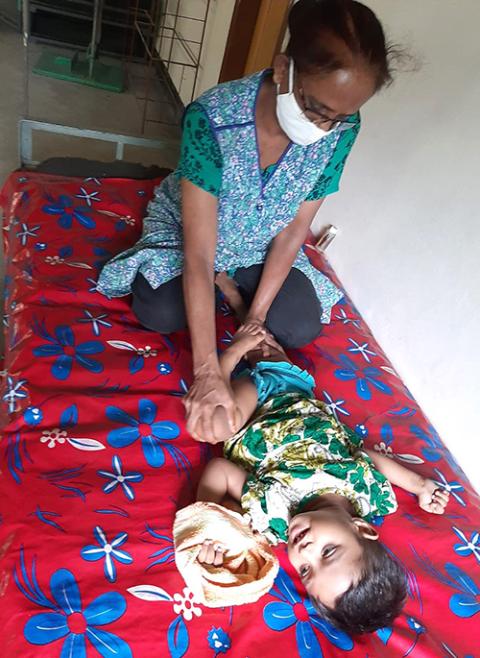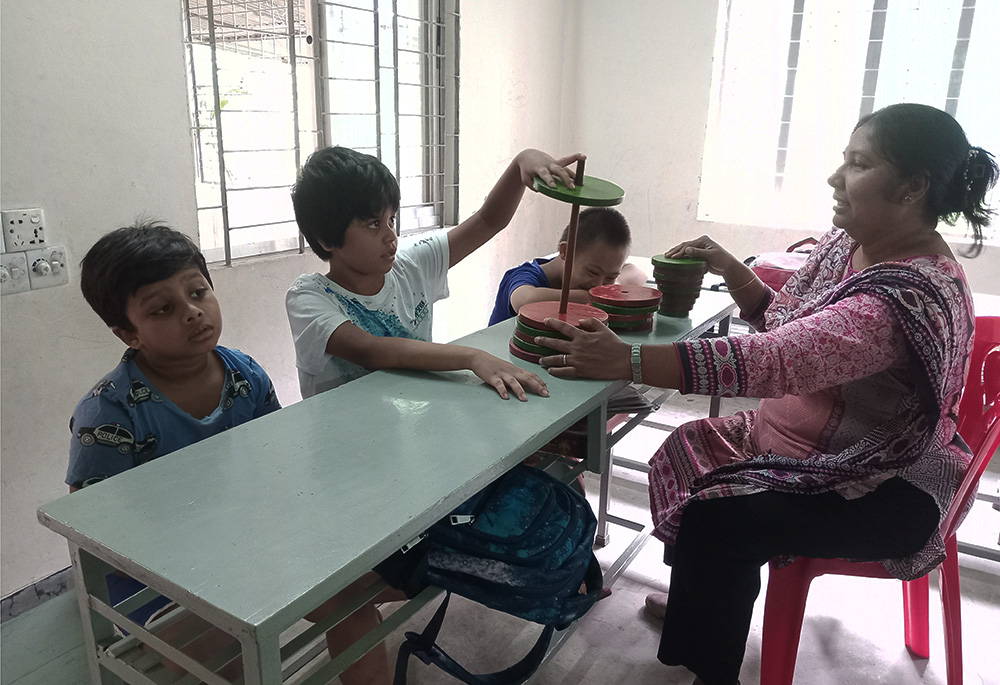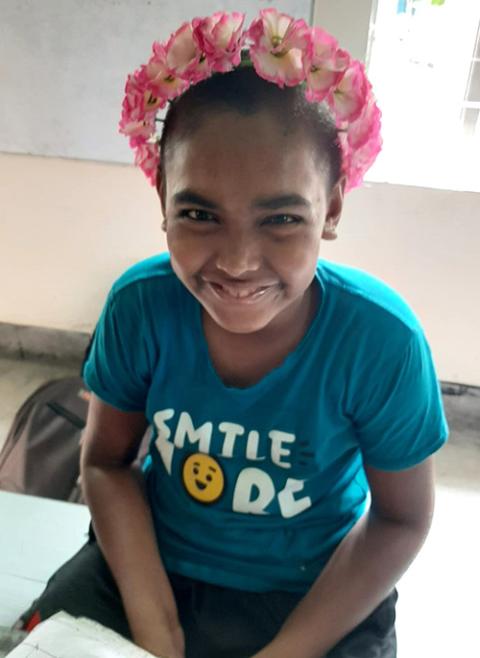
Sr. Nirmola Maria Goretti Cruze, 56, a member of the Holy Cross Sisters, has been working with children with disabilities in Bangladesh for 20 years. (Sumon Corraya)
For the last 20 years, Sr. Nirmola Maria Goretti Cruze, 56, a member of the Holy Cross Sisters, has been working with children with disabilities in Tejgaon, Dhaka. Cruze runs the Asha Greo, or Hope Center, which serves 40 children with disabilities. Cruze told Global Sisters Report that she loves working with disabled children and can't imagine her life without the Hope Center.
There is a shortage of schools for children with disabilities in Bangladesh. In addition, more than half of children with disabilities in Bangladesh do not go to school. Cruze's center has only 40 seats available. Many parents have requested to enroll their children, but they cannot enroll them due to a lack of seats.
Cruze charges only 200 taka (less than $2) per child for monthly tiffin costs. Despite limited resources, she manages the center with 10 teachers, and it has gained a good reputation in Dhaka. Many former students are now established and contribute to family and society despite being neglected by family members and relatives.
Advertisement
"Being a nun," Cruze said, "I am poor, but my heart is not poor. We love and respect people with disabilities, their parents and relatives."
GSR: Please tell us about the Hope Center.
Cruze: On July 1, 2008, the Hope Center was founded in the Nadda area of Dhaka. I served there until April 14, 2011. On April 15, 2011, another Hope Center was started in Tejgaon, Dhaka, and I took charge. Our aims and objectives are to help disabled children prepare for school or technical education so that they can be established in their lives and live with dignity, overcoming their physical and mental disability.

Sr. Nirmola Maria Goretti Cruze provides physiotherapy to a child at the Hope Center in Tejgaon, Dhaka. (Sumon Corraya)
Many disabled children cannot adapt when they first enroll in school. This center works as a helping hand for those children to go forward. We have 10 teachers serving them.
The Hope Center is not a school, but we prepare disabled children to be suitable to enroll in school. [Often], autistic children cannot sit calmly. It requires practice [for them] to sit in a classroom with patience and love. Once they learn, we start teaching them the alphabet and dowering. Teaching them takes so much time. Besides teaching, we conduct dance and game sessions that children love.
GSR: Why did you establish this center?
Cruze: We opened this center for the needy. In this country, the educational costs for disabled children are high, and needy parents cannot afford it. Hence, we started this center, and retired Auxiliary Bishop Theotonius Gomes of Dhaka manages [its] funds.
We conduct monthly sports competitions and give prizes to all participants. We also arrange annual study tours for them and visit different historical places near Dhaka. Through these activities, children get joy.

From left: Lopa Chakraborty, a Hindu woman, Sr. Nirmola Maria Goretti Cruze, and Buddhist Dipa Chakma are pictured at the Hope Center. Chakraborty and Chakma are mothers of children at the center. (Sumon Corraya)
Mainly, three types of disabled children, such as those with Down syndrome, autism and cerebral palsy, come to our center. Working with autistic children is hard. Their situation is worse in our country. We provide them with physiotherapy, and many are gradually [helped] by our services.
Normally, children enjoy our service and education for five to seven years and can enroll in school.
GSR: Working with disabled children requires special skills. Where did you train to serve disabled children?
Cruze: I took a three-month training on teaching disabled children from the Centre for Disability in Development in Savar, Dhaka. It included accommodation facility training. Through the training, I can identify disabled children easily. Before the training, I served disabled children since 2003 with the Missionary Sisters of the Society of Mary in Tejgaon for a few years. They also serve disabled children in Dhaka.

Antora Roy teaches songs to Mohammadulla, 12, an autistic child. He joined the center in February 2024. When he first came to the center, he was hyperactive, unable to listen to teachers. Today, he happily sits and enjoys class. (Sumon Corraya)
GSR: What is life like for disabled people in Bangladesh?
Cruze: Comparatively, now, people with disabilities are doing well. Parents of disabled children want to provide an education for their children. Once, they were ashamed to bring their children anywhere, and they didn't go to any social functions such as weddings with their disabled children, but now they bring them with them.
Our student Rohim's [not his real name] mother used to tie him with rope. When she learned about our center, she enrolled him, and now he stays at our center and is improving.
Parents of disabled children face many challenges. In this country, most infrastructure is not disabled person friendly. In public transport, people don't want to sit beside them. [Some] mentally disabled children don't understand social norms, and as a result, sometimes parents face odd situations. In 2023, an autistic teen touched a woman in Gulshan; that woman accused that teen, and later, people beat him badly. But it shouldn't have occurred. Many people don't understand the behavior of disabled children, and this creates problems.

Chamaly Rozario teaches colors to autistic children. (Sumon Corraya)
GSR: Please share some success stories of the Hope Center.
Cruze: Nik Roy, 20, had cerebral palsy. He couldn't walk, and his mother brought him here. I provided him with physiotherapy, and he has improved. He finished 10th grade and enrolled in college.
Zanith Gomes, 13, now reads at Holy Cross Girls High School, Tejagon. She was physically disabled and couldn't walk. Through our service, she enrolled in school and performed well.
Another former learner, Mohosin Islam, couldn't speak or hear, but after receiving our education, he took technical education. He returned to Brahmanbaria, eastern Bangladesh, and now works as a welder and earns money.

A happy child is pictured at the Hope Center. (Sumon Corraya)
Additionally, before enrolling children in our center, [some children] didn't wash their hands before meals or after using the toilet. We taught them this. Their parents expressed gratitude by saying, "We couldn't change our child's habit, but you know the magic. They learned these good practices from the Hope Center."
Some children dropped things through windows outside their homes and tried the same at our center, so we changed them. In the past, most children wouldn't eat vegetables, but we feed [them] vegetables at our center through tiffin, and now they eat vegetables at home, too. So far, around 200 disabled children have transformed their lives positively through our service.
GSR: What challenges do you face while serving in this ministry?
Cruze: When we first started the Hope Center, some Muslims spread the rumor that we proselytized Muslims into Christianity. Now, many of our students are Muslims. Secondly, we had a former student, Farzana Akter [not her real name], who was healthy, but her belly was comparatively large. One of her classmates, Rupa Islam [not her real name], told Akter, "There's a child in your belly."
When Akter returned home, she cried and told her mother that she couldn't come to our school because a baby was in her belly! The next day, around 16 angry women came to our center to beat me from the slum. Fortunately, Akter went to the center after hearing that the slum women had reached out to beat me. She told them, "Sister Nirmola didn't say that," and Rupa Islam had said a baby was in her belly. That day, I was saved by my student. Almost every month, I face such kinds of challenges.

Children enjoy tiffin at the Hope Center. (Sumon Corraya)
GSR: What is the beauty of this ministry?
Cruze: Persons with disabilities find a safe place here. They learn with joy and dignity. Parents come to our center with sad faces with their children, but after receiving our service, they return with gratitude and smiles.
Through this ministry, I share the Gospel through my good behavior. In this country, mothers of disabled children face great stress. I also obtained training in counseling from India, and I provide those women with counseling. I counsel them and help them to struggle for a better life instead of worrying.
GSR: Do you want to share anything else?
Cruze: This journey is not easy, but I feel happy as I always wanted to serve needy people. While I serve them, I can recall I am working for Jesus. As Jesus said, "For I was hungry and you gave me food, I was thirsty, and you gave me drink, a stranger and you welcomed me."





